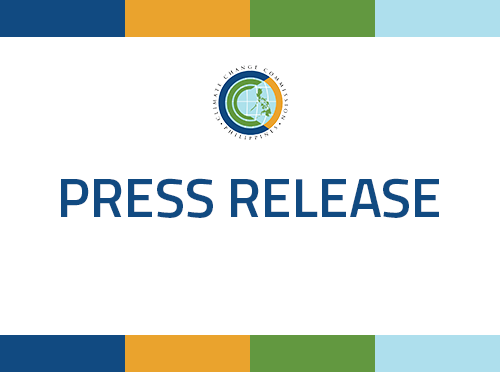
April 20, 2020 Monday

MANILA, 21 April 2020 – In preparation for the 2021 National Budget process of the Philippine Government, the Climate Change Commission (CCC) conducted the annual orientation on Climate Change Expenditure Tagging (CCET) to aid national government agencies to identify, design, and tag climate adaptation and mitigation programs, activities, and projects for inclusion in the General Appropriations Act. Under enhanced community quarantine due to CoViD-19, this time, the orientation was held virtually.
“We are grappling with an unprecedented crisis of enormous scale and impact. But this is also an extraordinary time when our work in government is most critical. Everything we do during and after this pandemic will ultimately define the country’s readiness and responsiveness to the challenges of the new normal,” said CCC Secretary De Guzman in his opening message delivered by CCC Assistant Secretary Romell Antonio O. Cuenca.
Around 200 participants from various National Government Agencies (NGAs), Constitutional Offices, and Government Owned- and Controlled- Corporations (GOCCs) were oriented on the expenditure tagging process, with topics ranging from climate change science, domestic and international responses to climate change, and governance.
Leading the orientation were Sec. De Guzman represented by Asec. Cuenca, Undersecretary Analiza Rebuelta-Teh and Director Elenida Basug of the Department of Environment and Natural Resources (DENR), and Assistant Secretary Rolando Toledo of Department of Budget and Management (DBM).
The CCET was issued as a joint policy of the DBM and CCC, through DBM-CCC JMC 2015-01, which requires government instrumentalities to tag climate-related items in the budget using climate change typologies. Tracking climate expenditure helps monitor the progress implementation of climate actions in the country.
“Since the enactment of the Climate Change Act of 2009, we have institutionalized the mainstreaming of climate science and risk information in the government’s plans, policies, and investments. In 2015, we enhanced our budget process to include CCET. Through this, we are able to identify the extent of adaptation and mitigation actions that the government could fund, and those that we could put on the table for climate finance,” said Sec. De Guzman.
The activity aimed to further strengthen the mainstreaming of climate change in the government’s work by emphasizing on processes, roles and responsibilities, and collaboration. This year’s focus audience are member agencies of the CCAM-DRR Cabinet Cluster, the Climate Change Advisory Board (CCAB), and the technical working group of the Risk Resiliency Program (RRP).
The Risk Resiliency Program (RRP), under the Program Convergence Budgeting, is the framework program to assist the government in strengthening the resiliency of natural ecosystems and the adaptive capacity of vulnerable communities to short- and long-term risks using a landscape management approach in selected major and principal river basins. The convergence between CCET and RRP is highlighted in this year’s orientation to advance said shared results in the sector.
The RRP, aligned with Philippine Development Plan (PDP) and the National Climate Change Action Plan (NCCAP), allows the Cluster to focus the available fiscal space on the key priority programs on Climate Change Adaptation & Mitigation, and Disaster Risk Reduction (CCAM-DRR) within and across the national government agencies. The DENR leads the program as the Chair of the Cabinet Cluster on CCAM-DRR.
“As we confront the challenges of the new normal in the era of climate change, we need to prepare a national budget that will protect the lives and livelihoods of our people from the impacts of climate change and will save our planet from further destruction,” said De Guzman.